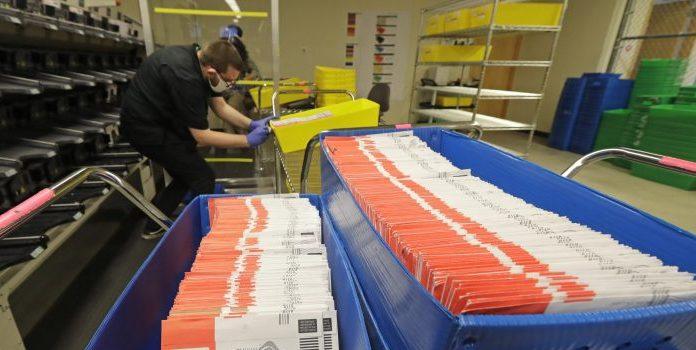With the bulk coming from Cook County and Chicago, more than 463,000 vote-by-mail ballots could be in the mix for Illinois’s Nov. 8 election, delaying election outcomes by up to two weeks.
Along with early voting beginning Thursday in Illinois, local elections officials are sending out requested vote-by-mail ballots. Illinois State Board of Elections spokesman Matt Dietrich said those mail-in ballots will take up to two weeks to count after the polls close Nov. 8.
“It really depends on how many vote-by-mail ballots are still out on election night,” Dietrich told The Center Square. “We do want to be clear to people that this is normal.”
State elections board data shows that in 2018, about 9% of total votes cast, or around 427,500, using absentee, or mailed-in ballots. In 2020, when vote-by-mail was expanded for concerns of spreading COVID-19, 33% of total votes cast were mailed in, or around 2 million. For the Nov. 8, 2022, election, the most updated data show more than 463,000 requested mail-in ballots.
“You’re going to see those numbers change [after the polls close], especially in the five or so days immediately after the election,” Dietrich said. “That’s when the bulk of properly postmarked ballots will arrive.”
Completed vote-by-mail ballots must have a post mark no later than election day, Nov. 8, to be counted. Voters have the option of destroying or surrendering their mail-in ballots if they choose to vote in person early or on election day.
Dietrich remembers that as recently as the 2014 Illinois Treasurer’s race, projections changed drastically.
“They had a race that was too close to call on election night and it was only after the mail ballots came in in those days after the election that Mike Frerichs’ margin of victory expanded to several thousands votes,” Dietrich said.
The Heritage Foundation recently ranked Illinois 40th in election integrity. Zack Smith said mail-in balloting is one thing impacting Illinois’s ranking.
“Illinois doesn’t have very robust restrictions against vote harvesting and vote trafficking,” Smith said.
He warned that mail-in balloting is vulnerable.
“Absentee ballots, they are one of the areas most rife with fraud,” Smith said. “Unfortunately, many on the left have kind of pushed this narrative that voter fraud doesn’t really exist, that it’s just kind of fear mongering by those who are pushing for strict overview of absentee ballots, but that’s just not true.”
Smith said the Heritage Foundation also keeps a verified vote fraud database at their website.
The election in Illinois features not only county, statehouse and congressional elections, voters will also choose who will be the next U.S. senator, governor, attorney general, comptroller, secretary of state and treasurers.
There’s also a statewide constitutional amendment where voters will decide whether to codify collective bargaining in the Illinois Constitution.

